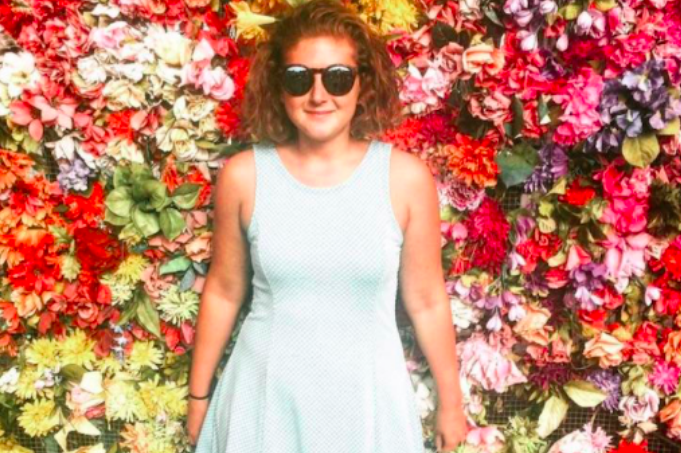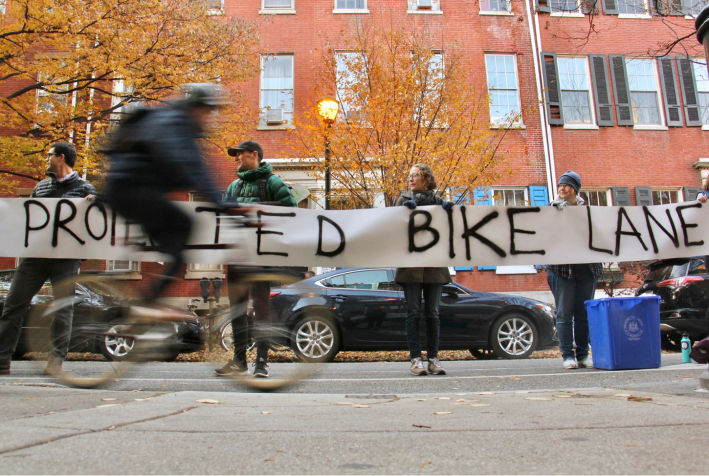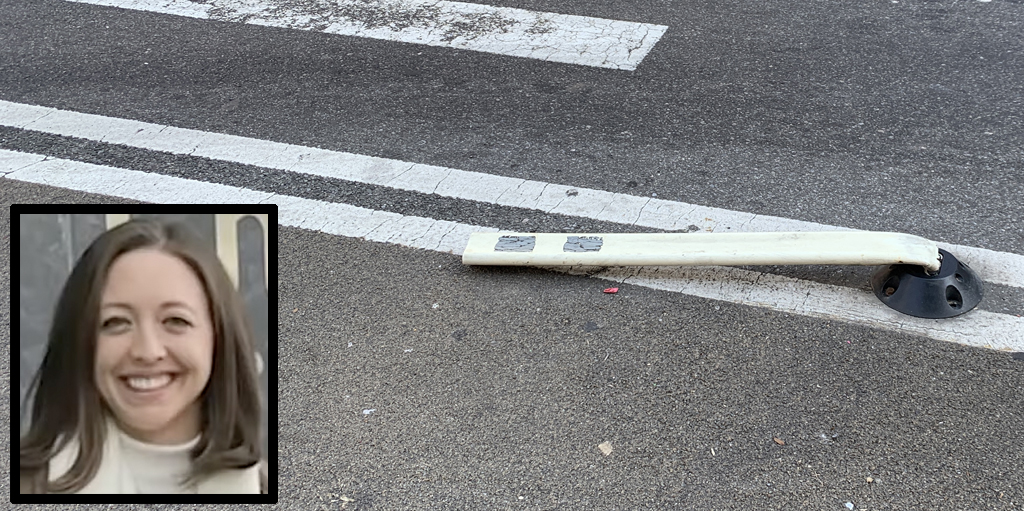The horrific death of a Philadelphia cyclist in the famous Rittenhouse Square neighborhood has local advocates demanding that the city finally install real protection on its bike lanes — and sparking a conversation about why half-measures like flex posts are so common in U.S. cities.
Last Wednesday, an unidentified 68-year-old motorist drove his Volkswagen over the flexible plastic posts that lined the Spruce Street bike lane and fatally struck 30-year old Barbara Friedes at a high rate of speed, witnesses said.
Police say the Colorado native's body was thrown "20 or 30 feet" before landing, causing the fatal head injuries; the driver lost control of his vehicle and crashed into two parked cars, sustaining minor injuries, and was not arrested.
The crash made national headlines, with outlets like CBS and the Daily Mail sharing grisly footage of the wreckage as well as moving stories about Friedes, who was remembered as a "beacon of light" for her work as her pediatric oncologist and chief resident at the Children's Hospital of Philadelphia.
For local street safety advocates, though, the devastating loss was also part of a larger pattern of traffic violence that claimed the life of another vulnerable road user in a separate crash that occurred the very same hour, after a driver blew through yet another inadequately protected bike lane and struck a pedestrian standing on a street corner. A third crash on a segment of the city's high-injury network, meanwhile, left yet another pedestrian critically injured just hours before.
... Oh and of course we're back to people parking their cars in the bike lane again today, including AT THE SITE OF THE CRASH pic.twitter.com/eqj8wog5J3
— Dunkaccino (@DakarAdana) July 18, 2024
Advocates say the absence of hard infrastructure like bollards is the common denominator in traffic violence against people outside cars. But Philly Mayor Cherelle Parker recently slashed the budget for Vision Zero projects by 60 percent, though she claimed she was re-committing to the goal of ending traffic deaths and serious injuries just months ago.
"These bike lanes are unsafe, and that people park in them, people are driving in them," said Russell Richie, a board member with the urbanist political action committee 5th Square. "[They say] 'Where am I gonna pick up my and drop off my kids from sports?' They'll even say things like, 'Oh, it's so hard to raise a family in the city these days' — as if people who ride bikes don't have families, too."
The is absolutely heartbreaking.
— Civic Grit (@civic_grit) July 18, 2024
I am incensed.
The driver drove straight over the "protective" flex posts.
In most other US cities those would have been actual bumps or a curb. She might still be alive.
Philly politicians prevented that. https://t.co/KA6SFE7w4u
A lack of funding for protected bike lanes isn't the only reason why flex posts are such a common sight in Philadelphia — or in other U.S. communities.
At the state level, advocates say Philly struggles under an onerous Pennsylvania law that requires cars to be parked within 12 inches of a curb — essentially rendering the city unable to reorganize lanes so that bike paths are protected by parked vehicles. And, locally, advocates say drivers are actually allowed to use inadequately protected lanes as temporary loading zones for up to 20 minutes without getting a ticket, creating confusion about who these spaces are really for.
Congregants at religious institutions along Spruce Avenue, meanwhile, are even allowed to park on bike lanes on the weekends, a common problem along a corridor which is home to more than a dozen houses of worship.
this is embarrassing and insulting pic.twitter.com/KJrz5NwA4S
— Alan Fisher (@alanthefisher) July 18, 2024
Perhaps the biggest roadblock to better bike lanes, though, is Philadelphia's informal practice of "councilmanic prerogative," in which councilpeople are heavily discouraged from voting against proposed road design changes in another council member's district — even when those changes could save lives and deliver the continuous network that cyclists need.
A similar practice is common among communities across America. In Philadelphia, though, advocates say it's resulted in particularly large gaps in the protected cycling network, both because of the heavy influence of hyper-local groups that are dominated by drivers, and because the council is required to approve every single bike lane whose existence relies on any form of variance from local parking standards — whether that's removing a space entirely, or simply adding a "no stopping" or "no parking" sign.
"Basically, district council members are mayors of their own district, they can make all their decisions they want — and they can listen to whoever they want," explained Nicole Brunet, policy director of the Bicycle Coalition of Greater Philadelphia. "And none of the other council members will ever vote against eachother's legislation. It's like, 'It's my district; you can't tell me I can't do it.' Which means, of course, that we have a piecemeal network."
Spruce and Pine should have been protected a decade+ ago. But @PHLCouncil(s) and @PhillyMayor(s) have shown no political will to simply end PREVENTABLE death.
— Dena Driscoll (@bikemamadelphia) July 18, 2024
Brunet's office sits three blocks from the site of the crash that killed Friedes, and she awoke on Thursday to text messages from loved ones worried she was the one who'd been killed. Her organization has been fighting for true protection along Spruce Street since before 2009, when the city leaders first agreed to add a bike lane and diet the road, which is among the most heavily used cycling routes in the whole city.
She says, though, they went with "the weakest design" on offer: a stripe of paint on the right hand side, with only a narrow, painted buffer between bikes and car traffic.

That design wasn't improved until after 2017, when 24-year-old Emily Fredricks was killed by a distracted trash truck driver who made a right turn and struck her in the bike lane just seven blocks away from where Friedes was later killed. After advocates staged a "person-protected" bike lane to protest the city's inaction along the corridor, leaders agreed to move the actual bike lane to the opposite side of the road — and add the now-infamous flex posts along its length.
The Federal Highway Administration says that flexible delineators can reduce car-into-bicycle crashes 53 percent compared to paint alone, and many cities favor them because they don't damage vehicles when they're struck. The death of Barbara Friedes, though, shows exactly how deadly that tradeoff can be when crashes do happen.
"[We call them] 'falsies,' like false eyelashes, because they're fake and they don't do much," said Steph Davis, chair of 5th square. "They don't do the same things that a bollard would do; they don't do the same things that a concrete barrier would do. And it means that people are losing their lives."

Davis hopes that the outrage over Friedes's death will finally be enough to get Spruce Street the protection it needs. They argue, though, that it shouldn't take the headline-grabbing deaths of people with privilege to prompt change — and that the disproportionately Black and brown Philadelphians who are increasingly falling victim to traffic violence deserve every ounce of the same outrage.
"We'll keep pushing for layer after layer [of safe systems interventions] until we reach Vision Zero," they added. "And we'll keep going beyond that, because nothing is ever enough — and we can never bring any of these people back."
Other advocates agree that Philadelphia shouldn't rest on its laurels, even if the city as a whole is ranked in the 92nd percentile on PeopleForBikes' annual Bicycle Friendly City rankings, and Rittenhouse Square is a frequent darling of urban design enthusiasts.
"Pretty much every land-use decision in Philly is made through the lens of, 'How will this affect cars? How will this affect parking? How will this affect my ability to speed through a neighborhood?'" added Richie. "I think [having more] places moving in the direction of Rittenhouse Square would be great. But I definitely don't think it should be the end goal — because things can, and should, and need to be a lot better than that."
As a state, we must enable parking protected bike lanes, and transform our approach to transportation through a “Complete Streets” framework that prioritizes all modes of transportation equally. We can ensure safety for all our city’s residents, no matter how they travel. (4/4)
— Senator Nikil Saval (@SenatorSaval) July 18, 2024
For Brunet, saving lives along Spruce — and everywhere else in Philadelphia — will require eliminating the special permits that allow houses of worship to "treat bike lanes a overflow parking" on the weekends, as well as new signage that makes even stopping in bike lanes a ticketable offense.
More than anything, though, the flex posts have got to go, along Spruce and everywhere else in the city — and giving vulnerable road users real protection must become a real priority.
"What are those flex posts doing?" Brunet added. "It should not be in our toolbox to continue to use them. And I would bet you that it costs us more money to continue to replace them, because we have to replace them all the time when people run over them. ... [We're fighting] a constant battle between parking convenience and safety of vulnerable road users in Philadelphia, and we're not unlike any other city, in the world in that regard. It's really a matter of your convenience versus my life."
Editor's note: the Bicycle Coalition of Greater Philadelphia has launched a petition in support of concrete-protected bike lanes and other road safety improvements. Sign it here.






